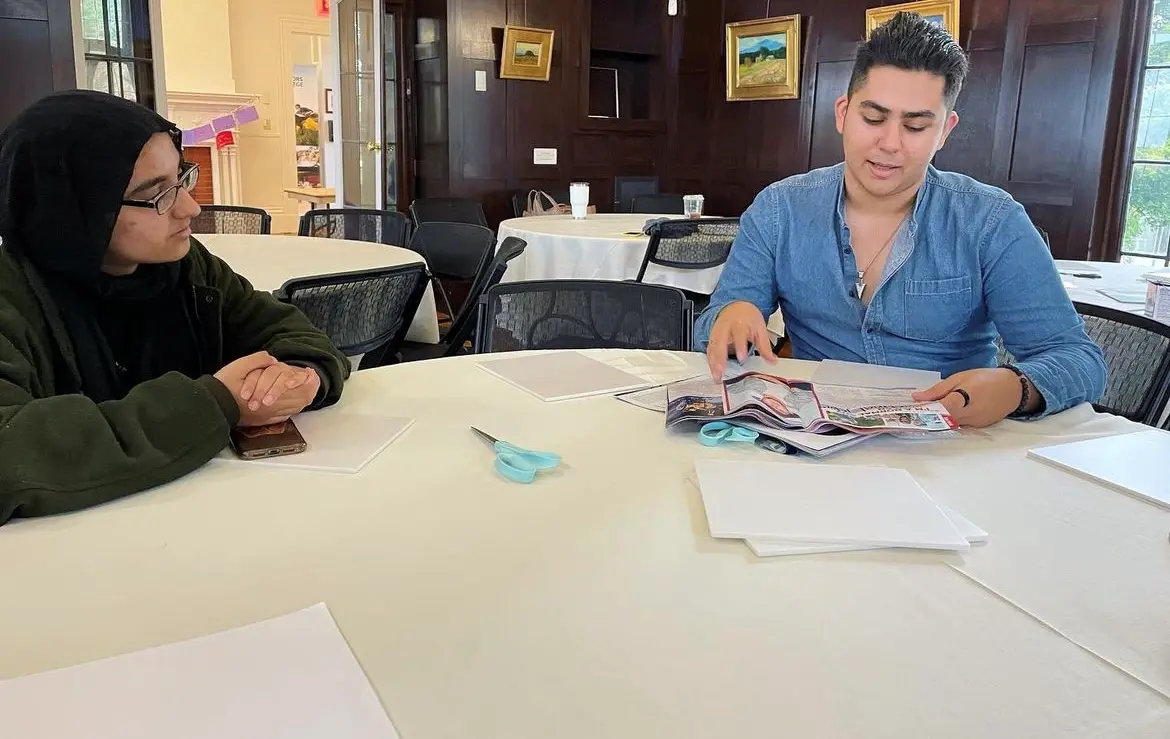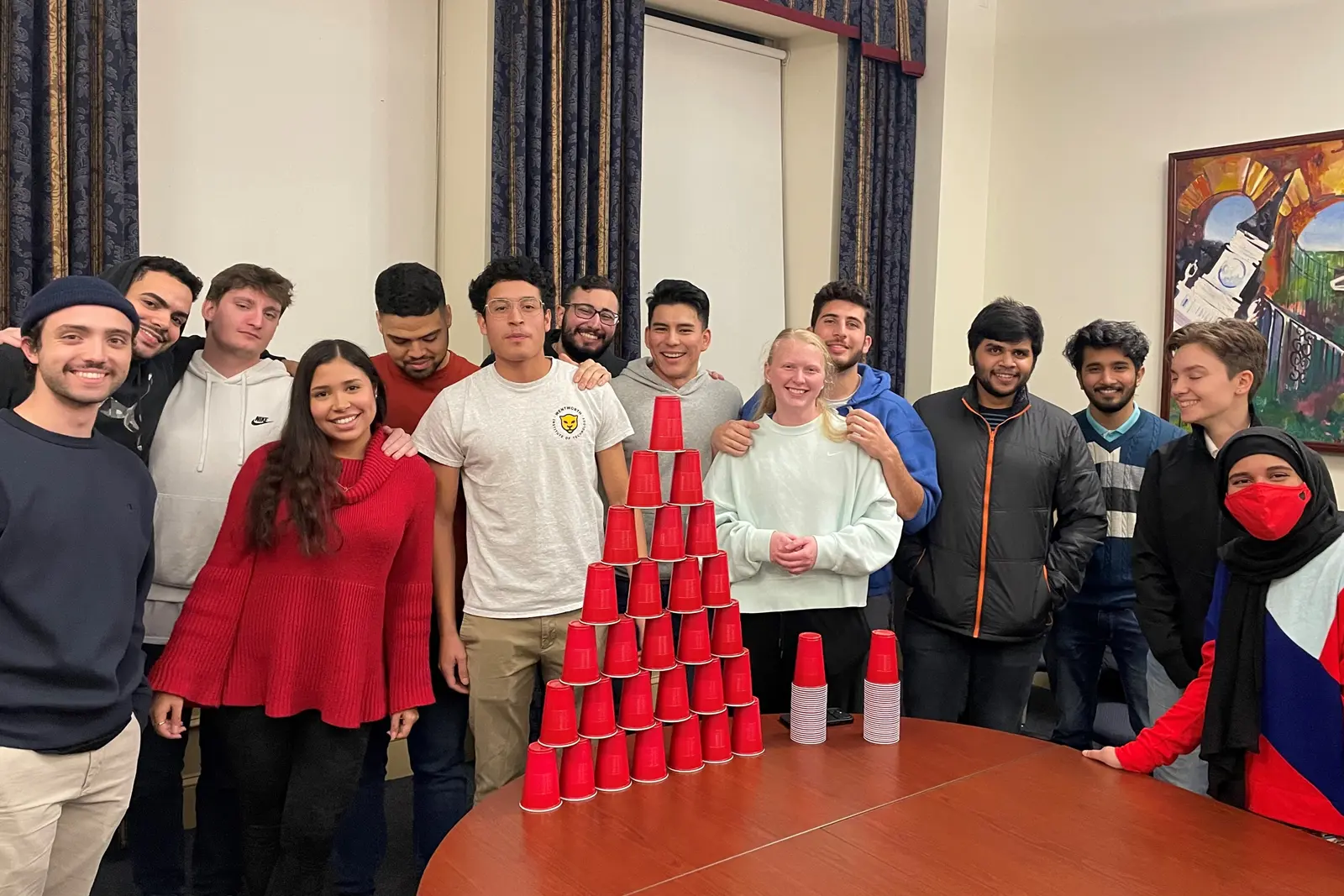New Initiative Helps Connect Students to Campus Resources

Well-being leaders with Ruben Sanca, left, and Hannah Montbleau, right.
By Brooke Coupal
Casey Tiernan felt the pressure as finals week approached during her first year of college.
“Because I had a scholarship, I had to do well, and that was in the back of my head at all times,” says Tiernan, who was then majoring in exercise science at a private college.
Tiernan would study for eight consecutive hours a day and would forget to eat. She ended up in the emergency room with dehydration.
“I got really sick from not taking care of myself, and I didn’t even do the greatest on my finals. My grades were just average,” she says.
Tiernan learned the hard way about the importance of taking study breaks and practicing self-care – two lessons she preaches as a student well-being leader at UMass Lowell, where she transferred in the fall of 2020.
The Office of Student Life and Well-being launched the well-being leaders initiative this semester, offering 10 students the paid opportunity to promote a culture of wellness on campus by supporting the well-being of their peers.
“The well-being leaders are an extension of our office,” says Ruben Sança, director of student life and well-being. “What they’re doing has an impact on students' lives.”
Guiding Students to Help
Whether a student is dealing with exam-related stress, having trouble making friends or struggling to manage their finances, they can turn to a well-being leader for confidential support.
The well-being leaders represent all colleges across campus: the Zuckerberg College of Health Sciences (ZCHS), the Kennedy College of Sciences (KCS), the Manning School of Business (MSB), the Francis College of Engineering (FCE) and the College of Fine Arts, Humanities and Social Sciences (FAHSS). Each well-being leader holds about four office hours a week at their respective colleges, where students seeking help can stop by.
Fahad Alden, a well-being leader for FAHSS, holds his office hours in Coburn Hall Room 132, an easily accessible spot for FAHSS students. When meeting with a student, Alden pinpoints their struggles by going over with them the eight dimensions of wellness: emotional health, physical health, financial health, occupational health, intellectual health, environmental health, spiritual health and social health.
 “Some people may be struggling with one dimension, while others are really struggling with three dimensions, so I try to see where they’re at and then list out some possible solutions,” says the sophomore digital media major from Bedford, Massachusetts.
“Some people may be struggling with one dimension, while others are really struggling with three dimensions, so I try to see where they’re at and then list out some possible solutions,” says the sophomore digital media major from Bedford, Massachusetts.The well-being leaders learned about the eight dimensions of wellness during an eight-hour training session held before the academic year by Sança and Hannah Monbleau, assistant director of student life and well-being.
“If a student comes to us and says they are stressed out, we can break that down by dimensions and find out what they’re really stressed about,” Monbleau says.
From there, the well-being leaders can offer the students tips on topics like time management and maintaining friendships, or they can direct them to resources on campus like the Wellness and Career and Co-op centers.
“The well-being leaders are not necessarily going to be the experts in any of these dimensions,” Sança says. “But they can provide information about resources on campus, and that alone is a huge help to our students.”
During training, the well-being leaders learned about on-campus resources, including the Office of Multicultural Affairs from Director Amy Liss and The Solution Center from Tara Antifonario, senior assistant director of financial aid. They also became familiar with the Office of Student Life and Well-being’s website, which lists resources for each dimension of wellness.
“There’s actually a lot of resources at UMass Lowell that students may not know about,” says Medi Woldemichael, an MSB well-being leader and a sophomore business administration major from Ethiopia. “If a student comes to us, we can help them find the right one.”
Kate Legee and Michael Coughlin, director and associate director of the Office of Student Conduct, shared with the well-being leaders how they can make reports on students they are concerned about to UML’s behavioral intervention team called Students at Risk (STARs).
Promoting a Culture of Wellness
Yashvi Patel and Haiya Patel (no relation), both KCS well-being leaders, feel most students are more comfortable seeking out peers when initially looking for help.
“Talking with a peer removes that fear of judgment, because they have also gone through similar experiences,” says Yashvi Patel, a junior biology major from Lowell, Massachusetts.
The well-being leaders write about their experiences in blog posts that tie into at least one dimension of wellness. Jayla Galvez, an MSB well-being leader, recently wrote about procrastination and the tips she uses to keep herself on task.
“I really like writing about things that are relevant,” says the business administration major from Brockton, Massachusetts. “I want my blogs to help people.”
PreYelle Grinkley, a FAHSS well-being leader, wrote her first blog on how music can have a positive impact on people.
“I have always noticed that I feel happier or healed after listening to music that resonates with me,” the sophomore from Boston wrote.
 In addition to office hours and blog posts, the well-being leaders hold wellness events. Tiernan and Ashley Asuncion, ZCHS well-being leaders, ran a table at Fall Fest on South Campus to let other students know about the service and how to tap into it. Tiernan, a senior public health major from Methuen, Massachusetts, also plans on running an aromatherapy table at the Mind/Body Fair in the University Crossing lounge on Dec. 13.
In addition to office hours and blog posts, the well-being leaders hold wellness events. Tiernan and Ashley Asuncion, ZCHS well-being leaders, ran a table at Fall Fest on South Campus to let other students know about the service and how to tap into it. Tiernan, a senior public health major from Methuen, Massachusetts, also plans on running an aromatherapy table at the Mind/Body Fair in the University Crossing lounge on Dec. 13.Alejandra Malaga Walters and Doa Jamal, FCE well-being leaders, hosted a cup-stacking tournament in Southwick Hall in mid-November.
“I wanted to do something fun that would attract engineering students,” says Malaga Walters, a junior industrial engineering major from Peru.
“Students got to socialize, meet new people, have fun and destress,” adds Jamal, a biology major from North Andover, Massachusetts.
Monbleau, who supervises the well-being leaders, says they have gone above and beyond their assigned duties. Many of the well-being leaders visited first-year seminar classes to promote the initiative, while some created Instagram pages for the college or school they represent.
Sança and Monbleau plan to continue growing the program and are happy to see the progress the current well-being leaders have already made.
“My goal for them was to at least impact one student each this semester,” Monbleau says. “I feel like they’ve reached that goal.”




